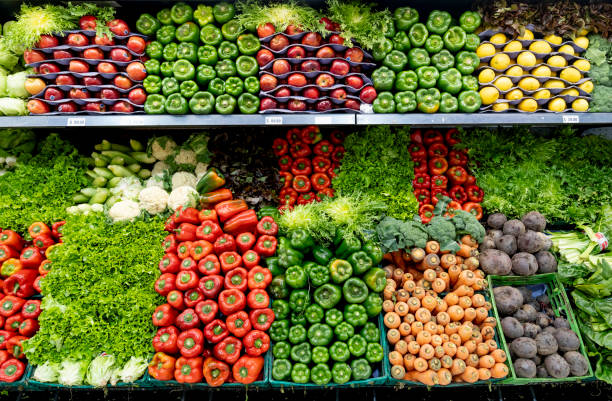Try our new free GreenChoice - Food Scanner mobile app!
DOWNLOAD-
-
-
Diets
Allergies
Take our 30-second quiz & we’ll filter our site to show only products that match your dietary preferences.
- GCNow
- Non-GMO vs. Organic: What’s the Difference?
Non-GMO vs. Organic: What’s the Difference?
Authors: Katherine Stallard and Sydney WexlerPublished: October 13, 2021

Trying to treat both your health and the planet right is a difficult task, especially when deciding what to eat. With labels like “non-GMO” and “organic” littering the grocery store on a wide range of products, from onions to pre-packaged cookies, it can be confusing to decipher the difference between the two and what these labels mean.
We’ve curated a careful breakdown of the differences between non-GMO and organic food products to help you navigate all the supermarket confusion and make conscious choices about exactly what you’re eating.
What is a non-GMO?
A “genetically modified organism” or GMO is any plant, animal, microorganism, or organism whose genetic makeup has been modified in a lab using genetic engineering.
GMO’s do not occur in nature, and this causes many consumers to be suspicious towards their effects on their health (1).
GMO food products are most often created to be resistant to pests via herbicides and pesticides that help farmers prevent crop loss (2).
Non-GMO products exclude GMO ingredients but only GMO ingredients, meaning that while the product doesn’t include GMO ingredients, it’s still grown using conventional food production methods (3).
What is organic?
“Organic” is a term that describes how agricultural products are produced, processed, and grown. Typically in the U.S, to be organic, a food product must be certified USDA Organic and meet a strict set of requirements to achieve organic status.
Organic products are also inherently non-GMO — in fact, no organic foods are grown or handled using genetically modified organisms, and GMOs go directly against the USDA’s organic standards (4).
Key differences between non-GMO and organic
While there are some plus sides to choosing non-GMO products, non-GMO products don’t have nearly as many standards as organic products and can still end up containing harmful ingredients like artificial colors, antibiotics, pesticides, and more (5).
Despite many fears and consumer apprehension towards GMO food products though, there is no conclusive science that GMOs are more harmful to human health than traditionally grown food sources (6).
That being said, non-GMO food products don’t do nearly as much good for the environment as organic products, which must verify its organic procedures during growing processes, harvesting, and all the way through production.
To summarize, the key differences between non-GMO and organic are:
- Non-GMOs restrict the use of GMOs but allow for use of pesticides and other chemicals
- Organic products are also non-GMO but also pesticide-free, herbicide-free, antibiotic-free, and more
- Organic products tend to be more environmentally-friendly than non-GMO products, but not necessarily more nutritious
Should I choose non-GMO or organic? Here are the key takeaways:
The bottom line is that not all non-GMO products are organic, but all organic products are non-GMO.
That being said, choosing organic foods is the most comprehensive option when it comes to sustainable production and avoiding synthetic ingredients and pesticides.
What’s important to note, though, is that neither organic nor non-GMO products are inherently more nutritious. If you’re considering the impact of your food choices on the planet and your health, it’s important to consider other factors, such as looking for food options that are high in fiber and essential nutrients, while low in added sugar and saturated fat.
Some foods are grown with more pesticides than others, so there are a few that are best bought organic. Here are a couple of food items where an organic label means the most (7, 8):
- Apples
- Bell and Hot Peppers
- Cucumbers
- Celery
- Potatoes
- Grapes
- Cherry Tomatoes
- Kale/Collard Greens
- Peaches
- Spinach
- Strawberries
- Meat
- Eggs
- Dairy
Figuring out what food is best for you without compromising your values can feel like an uphill battle, and sometimes, labels like organic and non-GMO that are supposed to help you, confuse you even more.
After a careful analysis, the results find that when it comes to non-GMO vs. organic — organic food products are likely the better option to protect the planet and prevent consumption of artificial additives.
However, neither are inherently better for your health, so it’s important to take the nutritional value of both the organic and non-GMO option into consideration when making a decision between the two.
We hope our breakdown of non-GMOs vs. organic food products will empower you to make more conscious shopping choices, and if you’re feeling stuck, use our GreenChoice filter to make finding organic foods a breeze.

***
GreenChoice, PBC has evaluated and rated more than 340,000 food & beverage products across hundreds of attributes related to diet, health, and sustainability. Easily find the best products for you, the planet, & your budget. Sign up to access the GreenChoice marketplace, the first carbon-neutral online grocery marketplace for healthy, climate-friendly shopping.

